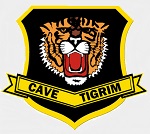Hobby Master HA3114 USAF Convair F-102 Delta Dagger Interceptor - 70907, 460th Fighter Interceptor Squadron, 337th Fighter Group, Portland IAP, Oregon, 1962 (1:72 Scale)
"The Deuce"
- Nickname for the Convair F-102 Delta Dagger
 The Convair F-102 Delta Dagger is an interceptor aircraft designed and produced by the American aircraft manufacturer Convair. A member of the Century Series, the F-102 was the first operational supersonic interceptor and delta-wing fighter operated by the United States Air Force (USAF).
The Convair F-102 Delta Dagger is an interceptor aircraft designed and produced by the American aircraft manufacturer Convair. A member of the Century Series, the F-102 was the first operational supersonic interceptor and delta-wing fighter operated by the United States Air Force (USAF).
The F-102 was designed in response to a requirement, known as the 1954 Ultimate Interceptor, produced by USAF officials during the late 1940s. Its main purpose was to be the backbone of American air defenses and to intercept approaching Soviet strategic bomber fleets (primarily the Tupolev Tu-95) during the Cold War. The aircraft was designed alongside a sophisticated fire-control system (FCS); however, a simplified unit had to be adopted due to development difficulties. It used an internal weapons bay to carry both guided missiles and rockets. On October 23rd, 1953, the prototype YF-102 performed its maiden flight; however, it was destroyed in an accident only nine days later. The second prototype allowed flight testing to resume three months later, but results were disappointing: as originally designed, the aircraft could not achieve Mach 1 supersonic flight.
To improve its performance prior to quantity production commencing, the F-102 was redesigned, its fuselage was reshaped in accordance with the area rule while a thinner and wider wing was also adopted. Flight testing demonstrated sufficient performance improvements for the USAF to be persuaded to permit its production; a new production contract was signed during March 1954. Following its entry to USAF service in 1956, the F-102 promptly replaced various subsonic fighter types, such as the Northrop F-89 Scorpion, in the interceptor role. The F-102C tactical attack model, equipped with several improvements, including a more powerful engine and Gatling gun, was proposed but not ultimately pursued. A total of 1,000 F-102s were built, both for the USAF and a handful of export customers, including the Hellenic Air Force and the Turkish Air Force.
By the 1960s, USAF F-102s had participated in a limited capacity in the Vietnam War as a bomber escort and even in the ground-attack role. The aircraft was supplemented by McDonnell F-101 Voodoos and, later on, by McDonnell Douglas F-4 Phantom IIs. Over time, many F-102s were retrofitted with infrared search/tracking systems, radar warning receivers, transponders, backup artificial horizons, and modified fire-control systems. Throughout the mid-to-late 1960s, many USAF F-102s were transferred from the active duty Air Force to the Air National Guard, and, with the exception of those examples converted to unmanned QF-102 Full Scale Aerial Target (FSAT) drones, the type was totally retired from operational service in 1976. Its principal successor in the interceptor role was the Mach 2-capable Convair F-106 Delta Dart, which was an extensive redesign of the F-102.
Pictured here is a 1:72 scale rendition of a Convair F-102A Delta Dagger interceptor that was attached to the 460th Fighter Interceptor Squadron, 337th Fighter Group, then deployed to Portland IAP, Oregon, during 1962.
Sold Out!
Dimensions:
Wingspan: 6-1/4-inches
Length: 11-1/4-inches
Release Date: March 2022
 Historical Account: "For the Defense" - Established in late 1942 as a ground support squadron, the 460th Fighter Interceptor Squadron deployed to the Pacific Theater of Operations in 1943. Initially it was sent to Australia where the unit functioned as a ground support unit at Sydney Airport, then at Dobodura in New Guinea. Converted to a P-47 Thunderbolt operational combat unit, engaged in fighter-bomber operations against Japanese positions in New Guinea, Netherlands East Indies and also during the Philippines Campaign (1944-1945). Moved to Okinawa, then Japan after the Japanese Capitulation as part of the Occupation Force, inactivated in 1946.
Historical Account: "For the Defense" - Established in late 1942 as a ground support squadron, the 460th Fighter Interceptor Squadron deployed to the Pacific Theater of Operations in 1943. Initially it was sent to Australia where the unit functioned as a ground support unit at Sydney Airport, then at Dobodura in New Guinea. Converted to a P-47 Thunderbolt operational combat unit, engaged in fighter-bomber operations against Japanese positions in New Guinea, Netherlands East Indies and also during the Philippines Campaign (1944-1945). Moved to Okinawa, then Japan after the Japanese Capitulation as part of the Occupation Force, inactivated in 1946.
The squadron was reactivated in 1954 as part of the U.S. Air Force Air Defense Command, stationed at Knoxville, for air defense of the Oak Ridge National Laboratory and TVA dams in eastern Tennessee. Moved to Portland AFB, Oregon, and flew air defense missions over the Pacific Northwest, later to southern California in 1968 at Oxnard AFB, which closed a year later; it then moved to Grand Forks AFB, North Dakota, until inactivated as part of the draw down of ADC in 1974.


